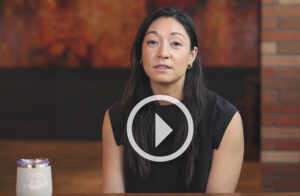Gabby Choi: There is so much power in patients advocating for themselves…

As a kid, Gabby Choi remembers spending hours in the bathroom with her mother, who also had HHT, as she dealt with her hemorrhagic nosebleeds that seemingly kept getting worse and worse.
It had a significant impact on her mom’s quality of life – with the frequent bleeds interfering with work or preventing her from wanting to socialize in fear of a bad bleed striking.
Sadly in 2017, Gabby’s mother Julia was diagnosed with pancreatic cancer. Because of her progressed HHT, she didn’t qualify for any of the clinical trials that could have given her a better chance at fighting the cancer.
Gabby’s own HHT symptoms remained relatively mild during her childhood. She’d go on to swim collegiately at Emory University and receive her MBA from Harvard Business School, but the experiences with her mother motivated her to get more involved with the HHT community and help in any way she could.
“I just saw firsthand the progressive nature of this disease, and how it can have an impact on so many aspects of your life,” Gabby says. “I didn’t want to wait. There is so much power in patients advocating for themselves, and I wanted to do my part.”
Gabby joined the board of directors at Cure HHT in 2020. She wanted to share her story, as well as give some behind the scenes, “insider” perspective. Gabby’s hope is that the next generation won’t know the struggles of those previous, and feels several factors are converging to make that future a reality.
“A confluence of things are happening that should give patients a lot of hope for what lies ahead,” Gabby said. “First, we’re seeing the disease is more prevalent than originally thought. You pair that with all the progress Cure HHT has created over the years to advance our understanding of the genetic makeup of this disease, and we have this powder keg of momentum in a way. We’re a disease that could have a lot of demand for biotech and pharmaceutical companies. We have a large patient population who to date haven’t had therapeutic answers, and we’ve done the leg work to build a solid understanding of the disease to help researchers move even faster.”
Now in her 30s, Gabby’s nosebleeds have started to worsen and she’s thinking about how to avoid passing this disease on to her children through the advancements with IVF and embryo genetic testing. But what’s on the horizon gives her hope for how her disease will be managed.
“My hope is HHT, one day, will almost be like set it and forget it,” Gabby says. “This is a complex disease that impacts everyone differently, so we need to have several therapeutic options. But my hope is my quality of life won’t be impacted as much as someone like my mother’s was.”
As a fellow patient turned board member, what would Gabby most want the HHT community to know? “The team at Cure HHT is so passionate. They can punch through walls,” she says. “This foundation is working every day to catalyze change. We need a few things to get there; one is funding, and the other is involvement – whether that means participating in research or talking to your network or volunteering with the foundation, this will take all of us. Don’t underestimate what you can do to help.”


